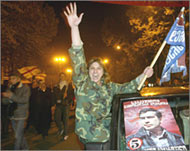New Georgian leaders seek US aid
Georgia’s new leaders are seeking urgent financial aid and have called for order and stability after the country’s “velvet revolution”.

On Monday, a senior economic aide close to the interim president said Georgia would ask Washington for $5 million to stage new elections after a discredited 2 November parliamentary ballot which led to Shevardnadze’s downfall.
Developments are being watched closely by Georgia’s big neighbour Russia, and by western powers wanting political stability to avoid problems with a pipeline being built through the territory to take Caspian oil to the Mediterranean Sea.
Shevardnadze, 75, resigned late on Sunday, bowing to three weeks of mass protests over economic mismanagement and widespread corruption during his 11 years in power, culminating in alleged vote-rigging in the November parliamentary polls.
Washington voiced support overnight for Nino Burdzhanadze, speaker of the outgoing parliament, who will act as head of state until new polls in the impoverished former Soviet state.
“The United States and the international community stand ready to support the new government in holding free and fair parliamentary elections in the future,” said US State Department spokesman Richard Boucher, adding that Secretary of State Colin Powell had called Burdzhanadze to offer support.
Under the constitution, presidential elections must be held within 45 days in the Caucasus mountain state, home to five million, but the status of the contested new parliament is ambiguous.
American educated
 |
|
Mikhail Saakashvili is tipped to be |
One strongly tipped candidate to replace Shevardnadze is Mikhail Saakashvili, a 35-year-old US-trained lawyer who, with Burdzhanadze, led the protests that toppled him.
Powell also spoke to Shevardnadze, and Boucher praised the former Soviet foreign minister – a hero in the West for his role in overseeing the end of the Cold war – for standing down “in the best interests of (Georgia’s) people”.
For her part, Burdzhanadze, addressing the nation in a broadcast late on Sunday, urged Georgians to restore order quickly.
“From tomorrow order and stability should be restored in the country and I appeal to all law enforcement agencies to return to a normal rhythm of work. And I appeal to our citizens to help them,” she said.
Early on Monday, only small knots of protesters huddled round the dying embers of fires outside parliament. Tens of thousands of Georgians delirious with joy had danced late into the night, honking car horns, waving flags and embracing each other at the news of Shevardnadze’s departure.
Much needed aid
Georgia’s new leaders were keen to project a business-like approach to the affairs of a nation plagued by separatism, corruption, high unemployment and poverty. The average salary is just $20 a month.
 |
|
Georgians were jubilant well into |
Zurab Zhvania, a top protest leader, said the interim leadership would start consultations with foreign governments for special financial and other assistance to rescue the country from its dire economic straits.
“We have to negotiate with those financial organisations like the International Monetary Fund (IMF), World Bank and also the European Union whose programmes were stopped under the previous government,” Roman Gotsiridze, head of parliament’s budgetary office and a prominent economist, told Reuters on Monday.
Lado Papava, an economist in Burdzhanadze’s camp, said: “The new leaders of Georgia intend to negotiate with the US government to get funds to hold new presidential and parliamentary elections as soon as possible. This would be around $5 million.”
The IMF broke off negotiations with the state, citing pervasive corruption and tax dodging, leaving it struggling to repay a $1.75 billion foreign debt.
Burdzhanadze had lined up alongside Saakashvili to turn the protests against alleged election fraud into a movement to replace the president.
On Saturday, the military stood aside when protesters seized the parliament building, and Saakashvili called Shevardnadze’s ousting a “velvet revolution”, echoing the peaceful toppling of
communism in Czechoslovakia in 1989.